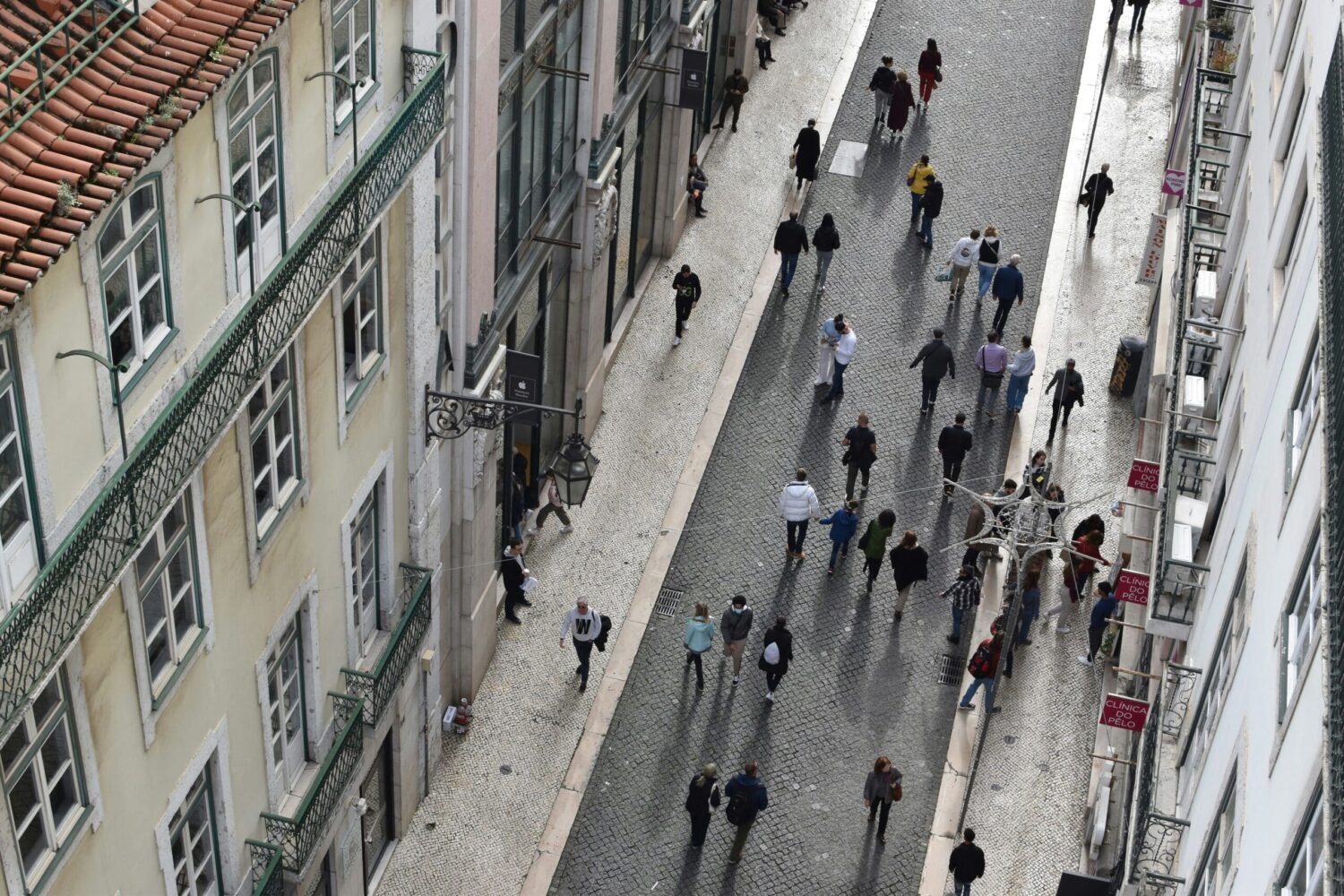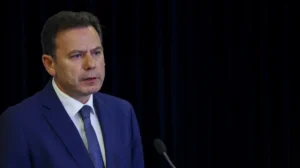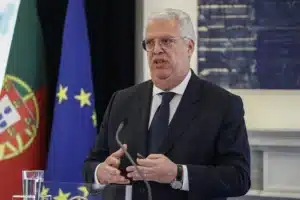Plan eliminates special rules that acted as fast-track for immigrants
Portugal presented a new immigration plan on Monday which puts an end to the country’s ‘manifestation of interest’ regime, which allowed non-EU migrants to move to Portugal without an employment contract and request residency after paying Social Security for a year.
“Portugal will not have its doors closed to those who are looking for an opportunity,” said Prime Minister Luís Montenegro during the presentation of the new plan. “But we cannot go to the other extreme of having our doors wide open”.
As the PM put it, “we believe we need to regulate immigration to give people dignity”.
Despite the tougher rules, the plan does aim to “streamline and prioritise the channels for immigrants to enter Portugal” for family reunification, young students, qualified professionals (although exactly which qualifications are needed has not been clarified) and nationals of Portuguese-speaking countries (CPLP).
The end of this special regime is only one of 44 measures detailed in the government’s new immigration plan.
The government has also announced the creation of a foreigners and borders unit (UEF) within Portugal’s public security police, PSP, to monitor the presence of immigrants and set up emergency response centres, and the creation of a “mission structure” to settle pending immigration cases. Says the plan, this new unit within PSP will be assigned “responsibilities of border control, return control (currently the responsibility of Portugal’s Agency for Integration, Migration and Asylum, shortened to AIMA) and surveillance on national territory”.
In fact, AIMA itself is due to be “restructured”, with the government “removing its authority to instruct and decide on return processes, making the Council for Migration and Asylum autonomous, clarifying the responsibilities for attracting qualified immigrants (human capital), consolidating the Observatory for Migrations (OM), and redefining the locations of AIMA offices.” AIMA’s “operational capacity” is also due to be strengthened with more employees and technological resources, the plan states.
This is the way the government has found to tackle the huge backlog of pending cases, estimated to be at around 400,000, that AIMA has been unable to deal with.
AIMA’s struggles have been well-documented and the process of dismantling SEF – Portugal’s previous border authority – and dividing its responsibilities amongst several other separate authorities has been almost universally recognised as a failure by everyone except the government members who signed off on it at the time. The agency’s issues have now only been compounded by the news that around 100 staff members are looking to leave AIMA. Whether the government’s new plan will be able to reverse the agency’s fortunes remains to be seen.
Elsewhere, the plan also aims to “strengthen the response and processing capacity of the consular posts identified as priorities”, with the reinforcement of 45 staff members in 15 countries, a list that includes all the countries of the Community of Portuguese Language Countries (CPLP).
The repeal of articles 88 and 89 of the Foreigners’ Law, which allowed foreign tourists to be legalised in Portugal, will be followed by a “review of the (general) law by parliament” in the coming months, says the plan. However, all applications already submitted will be processed, as long as they “have been correctly filled in” or have “more than one year of Social Security deductions”.
The government is also committed to renewing expiring documents, which are due to expire this month, and to “streamlining the procedures for granting visas and resident permits” to other Portuguese-speaking citizens.
Also mentioned in the plan is the creation of a “mission structure, with additional human, material and financial resources, made possible by extraordinary hiring measures, which includes officials from the Agency for Integration, Migration and Asylum, AIMA, inspectors from the former SEF [Foreigners and Borders Service] and other professionals to be recruited”.
This mission structure will be responsible for the “expeditious assessment of requests” and for stepping up face-to-face service to resolve existing backlogs.
According to Luís Montenegro, the new plan aims to implement the kind of rules that are needed in a country where immigration is growing at backbreaking speed, with foreigners already accounting for over 13% of Portugal’s workforce (see page 6).
“Having more than 400,000 people with pending regularisation processes is synonymous with lack of capacity, care, and humanistic approach,” he said, adding that Portugal must be able to “provide an answer to people, even if it is a negative one.”
“The worst thing is living in uncertainty, in unease,” the PM added.
Plan blasted by left and far-right
The government’s new immigration plan has been criticised by almost all opposing parties, with only liberal party Iniciativa Liberal (IL) seemingly pleased by the new measures that were announced.
Pedro Nuno Santos, leader of Portugal’s socialist party (PS), has labelled the plan as “vague” and said it could create a “legal void”, making the legalisation of immigrants living in Portugal even more difficult.
“We might be creating a problem for the future, with workers who are contributing but without the possibility of regularising their status,” said Pedro Nuno Santos.
Far-right party Chega’s vocal leader André Ventura believes the government’s measures do not go far enough, describing the plan as “weak, badly put together and ineffective.”
“If the plan is kept with the same level of inconsequence and ineffectiveness, it will have no chance of passing in Parliament,” said Ventura.
Meanwhile, left-wing party Bloco de Esquerda (BE) believes that the elimination of the ‘manifestation of interest’ regime will only lead to more illegal immigration.
“We fear this plan will actually worsen the problem, because if you eliminate one of the ways of legalising the immigrants who come here, what will happen is more undocumented immigration,” said BE coordinator Mariana Mortágua.
António Filipe, MP for Portugal’s communist party (PCP), criticised the “vagueness” of the so-called “mission structure” created to tackle the long backlog of pending cases.
“The government recognises the problem but offers a very vague solution in the form of a mission structure, without any concrete deadlines or goals about the human and physical resources needed to resolve this problem as quickly as possible,” the MP said.
Left-wing party Livre says this plan does not present “any kind of solution,” with MP Jorge Pinto stating that he does not think the government or the minister of economy believe in their plan, “as it poses difficulties to the arrival of new workers when they are essential for the country.”
Inês Sousa Real, the sole MP for the party representing “People, Animals and Nature” (PAN), also criticised the “paradox” presented by Luís Montenegro, who said he wanted to implement a “humanist integration policy” without explaining how the government will protect the “immigrants who are in a situation of social vulnerability.”
Providing at least some support to the plan was João Cotrim de Figueiredo, IL’s candidate for the European elections, who said he hopes the plan will not rely on “half measures” but praised the elimination of the “manifestation of interest” scheme, which he said IL had already proposed.
Plan to tackle queues at Lisbon and Faro airports
The government is also planning to implement “urgent measures” to tackle the long queues at border stations at Lisbon and Faro airports.
Singled out as one of the focuses of the government’s new immigration plan, the efforts to mitigate the issues will involve “adjusting the circuits of those spaces” and hiring more staff specialised in helping passengers navigate the “new border systems”.
The goal is to “optimise the path that travellers take when departing and arriving” and “increasing the number of stations whenever it is physically possible.”
michael.bruxo@portugalresident.com


























